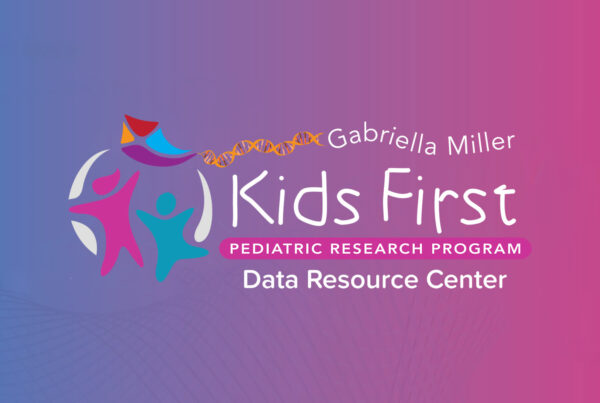Philadelphia, PA., October 24, 2023
WHO: The Gabriella Miller Kids First Pediatric Research Program (Kids First), an initiative of the National Institutes of Health (NIH)
WHAT: Kids First announces the release of nine robust new pediatric research datasets spanning childhood cancers, congenital disorders, and cross-condition data. New publicly available datasets include:
PEDIATRIC CROSS-CONDITION
Kids First and INCLUDE: Down Syndrome, Heart Defects, and Acute Lymphoblastic Leukemia
Principal Investigators: Stephanie Sherman, Emory University; Philip Lupo, Baylor College of Medicine
Children with Down Syndrome (DS) have a 2000-fold increased risk of atrioventricular septal defects (AVSD) and a 20-fold increased risk of acute lymphoblastic leukemia (ALL). The objectives of this study are to determine the genetic variants underlying AVSD and ALL risk in children with Down Syndrome.
CHILDHOOD CANCERS
Germ Cell Tumors Study Version 1
Principal Investigators: Jenny N. Poynter, PhD, University of Minnesota; Ching C. Lau, MD, The Jackson Laboratory
Pediatric malignant germ cell tumors (GCTs) are heterogeneous and grouped together due to presumed common cell of origin, the primordial germ cell (PGC). Two projects will be conducted to evaluate genetic susceptibility to intracranial and extracranial GCT by sequencing probands and their unaffected parents.
CONGENITAL DISORDERS
Neural Tube Defects Study
Principal Investigator: Joseph G. Gleeson, University of California, San Diego
Myelomeningocele (MM) is the most severe form of spina bifida: a neural tube defect (NTD) that is the most common CNS birth defect. Investigators explored new approaches toward studying NTD phenotypes and how folic acid’s effect on the epigenome and transcriptome reduces incidence of MM.
CHD Laterality Defects Study Version 1
Principal Investigator: Stephanie Ware, MD, PhD, Indiana University
Laterality defects are associated with structural birth defects and organ positioning abnormalities. This study elucidates the genetic architecture of laterality disorders to inform medical management and risk stratification. This study identifies that copy number variants as a mechanism of disease requires further investigation.
Kids First: Genetic Basis of Fetal Alcohol Spectrum Disorders
Principal Investigator: Christina Chambers, PhD, University Of California San Diego
Fetal alcohol spectrum disorders (FASDs) can occur in a person who was exposed to alcohol before birth. While preventable, it is estimated to occur in at least 1-5% of all children in the USA and is a major public health issue. This work will help to inform more effective intervention efforts for this common congenital disorder.
Kids First: Genomics of Orofacial Clefts in the Philippines
Principal Investigators: Elizabeth J. Leslie, Emory University; Mary L. Marazita, University of Pittsburgh; Jeffrey C. Murray, Univesity of Iowa
Co-Investigator: Carmencita Padilla. University of the Philippines Manila
Orofacial clefts (OFCs) occur when a baby’s lip or mouth do not form properly during pregnancy. These are genetically complex structural birth defects. This Kids First project focuses on whole genome sequencing (WGS) in 373 case-parent trios from the Philippines, where the OFC prevalence is particularly high.
Kids First: Genomic Etiologies of CHARGE Syndrome, Related Conditions and Structural Anomalies
Principal Investigator: Donna M. Martin, MD, University of Michigan
Co-Investigator: Stephanie L. Bielas, PhD, University of Michigan
CHARGE syndrome is a congenital disorder affecting vision, hearing, puberty, cognition, and development of craniofacial, skeletal, renal, and cardiac structures. Cohort includes 223 individuals and family members. Identification of genetic variants and modifier alleles of the genome will improve genetic diagnosis and provide important insights.
Kids First: Pediatric Research Project on Adolescent Idiopathic Scoliosis
Principal Investigator: Jonathan Rios, PhD, UT Southwestern Medical Center, Texas Scottish Rite Hospital for Children
Co-Investigators: Carol Wise, PhD. UT Southwestern Medical Center, Texas Scottish Rite Hospital for Children; Christina Gurnett, MD, PhD. Washington University
Adolescent idiopathic scoliosis is a genetically complex spine deformity. Genome-wide association studies have identified a limited number of risk loci that collectively represent a small fraction of the variation underlying disease risk. Subjects included in this study are children treated for Idiopathic Scoliosis (IS) and their family members.
Check FY19 Gharani – CAKUT
Principal Investigator: Ali Gharavi, MD, Columbia University
Congenital Anomalies of the Kidney and Urinary Tract (CAKUT) are responsible for up to 50% of pediatric and 7% of adult end-stage kidney failure. CAKUT frequently occurs in conjunction with other structural birth defects. This study investigated the causes of CAKUT by performing WGS on 550 case-parent trios of European descent.
WHEN: These nine new datasets are immediately available.
WHERE: Access a quality collection of more than 93,000 data records, including this newly released data, at Kids First Data Resource Portal. For detailed information about the new datasets listed above, use the links embedded in their description titles.
WHY: The Kids First Data Portal houses harmonized genomic sequencing data from participants diagnosed with pediatric cancer and congenital disorders and makes this data available at no charge to scientists and researchers across the world. Connecting researchers to these data portals creates opportunities to develop treatments and cures that would be nearly impossible if pursued by a single research program.
About the Gabriella Miller Kids First Data Resource Center
As part of the NIH Common Fund’s Gabriella Miller Kids First Pediatric Research Program, the Kids First Data Resource Center (Kids First DRC) is a collaborative pediatric research effort with the goal of understanding the genetic causes and links between childhood cancer and congenital disorders. The Kids First DRC’s expert doctors, scientists, and researchers work together with patient families to understand the underlying causes of these diseases in children on a biological level and to ultimately support the development of improved and targeted treatments. Learn more at kidsfirstdrc.org.










